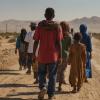
The MIG research group focuses on applying advanced data collection and estimation methods to quantify and better understand the trends, patterns, drivers, and consequences of different types of migration considering its interactions with the social, economic, and environmental dimensions of sustainable development.
Migration is a key demographic component underlying population change. As a multifaceted process, it is influenced by various factors such as economic opportunities, social and political drivers, environmental changes, and conflicts. Due to its high volatility and complexity, migration is difficult to assess and forecast, thus requiring a combination of data sources and methods. The MIG research group employs innovative approaches to provide comprehensive estimates of internal and international migration and its underlying factors at global, national, and sub-national levels. A particular focus of the research group is exploring how climatic changes and environmental factors directly and indirectly influence migration, and how these effects differ across geographical locations and population subgroups. In addition, the research group offers valuable insights into the interconnections between sustainability, human development, and well-being, highlighting their relevance for migration processes worldwide.
Models, tools, datasets
Projects
Staff
News

25 February 2025
Master Programme "Global Demography" at the University of Vienna

31 January 2025
Children in 2050: A contribution to the UNICEF's State of the World’s Children Report

15 October 2024
Climate change impacts internal migration worldwide
Events
Focus

11 November 2024
Why are people waiting longer to start a family? Exploring the trends, challenges, and choices behind delayed parenthood
Ahead of the Wittgenstein Centre Conference 2024 on Delayed Reproduction: Challenges and Prospects, which is set to take place from 21-22 November, researchers from the IIASA Population and Just Societies Program, the Vienna Institute of Demography, and the University of Vienna look into the shifting trends, drivers, and consequences of delayed parenthood.

24 June 2024
Predicting EU migration trends: merging traditional and social media data
IIASA researchers Dilek Yildiz and Guy Abel highlight the benefits of a new statistical model that combines traditional data sources like the census with real-time Facebook data to estimate EU migrant populations, offering valuable insights for policymakers.
Publications
Sterly, H., Borderon, M., Sakdapolrak, P., Adger, N., Ayanlade, A., Bah, A., Blocher, J., Blondin, S., Boly, S., Brochier, T., Brüning, L., Bunchuay-Peth, S., O’Byrne, D., Safra De Campos, R., Nii Ardey Codjoe, S., Debève, F., Detges, A., Franco-Gavonel, M., Hathaway, C., Funke, N., Gemenne, F., Gubert, F., Gurmu, E., Keeton, R., Ketsomboon, B., Leroy, M., Majidi, N., Marchisio, S., Abu, M., Naruchaikusol, S., Negozio, F., Nicolle, H., Nucera, G., Olsson, L., Owuor, J., Ozer, P., Piguet, E., Reckien, D., Redicker, S., Andreolla Serraglio, D., Sultan, B., Tänzler, D., Vigil, S., Vinke, K., Zantout, K., & Zickgraf, C. (2025). Habitability for a connected, unequal and changing world. Global Environmental Change 90 e102953. 10.1016/j.gloenvcha.2024.102953. Shaw, S., Chattopadhyay, A., Dey, S., & Hoffmann, R. (2025). The association of temperature extremes, ecosystem resilience, with child mortality: Novel evidence from India. Environmental Research 267 e120690. 10.1016/j.envres.2024.120690. Andrijevic, M. , Zimm, C. , Moyer, J.D., Muttarak, R. , & Pachauri, S. (2025). Representing gender inequality in scenarios improves understanding of climate challenges. Nature Climate Change 10.1038/s41558-024-02242-5. Tebecis, T. & Crespo Cuaresma, J. (2025). A dataset of structural breaks in greenhouse gas emissions for climate policy evaluation. Scientific Data 12 (1) 10.1038/s41597-024-04321-w. Zelingher, R. & Crespo Cuaresma, J. (2024). Commentary: From acute food insecurity to famine: how the 2023/2024 war on Gaza has dramatically set back sustainable development goal 2 to end hunger. Frontiers in Sustainable Food Systems 8 e1511320. 10.3389/fsufs.2024.1511320.









